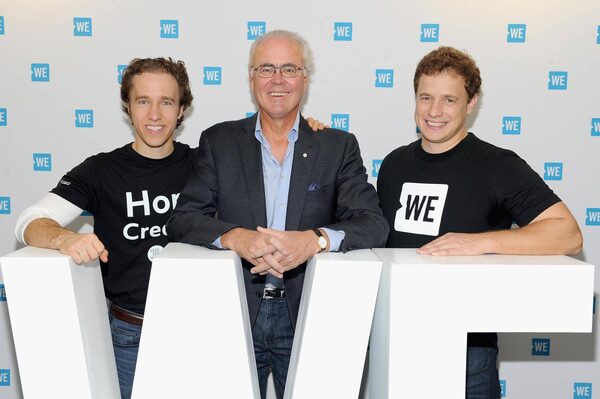
Craig Kielburger, left, philanthropist Hartley Richardson, and Marc Kielburger attend the We Day New York on Sept. 20.Craig Barritt
The average person spends 90,000 hours at work in their lifetime. Is it too much to ask that all those office hours count for something greater?
Our idea of work has evolved from running out the clock to seeking personal fulfilment. That personal desire for meaning is changing business for good, as companies meet mounting pressure from all of us, including consumers, who seek out socially conscious products.
Whether you're a baby boomer postponing retirement, or a millennial hitting your peak spending years, everyone wants to use their daily actions for good. Brands and businesses are critical forces in the mission for world change. More than just donating or volunteering, we can now make a difference at our desks, and with our purchases. Inside companies, millennials work for purpose more than paycheques. Three quarters of this generation would take a salary cut to join a good corporate citizen, according to Cone Communications. Sixty per cent of consumers would pay more for socially conscious products when shopping for brands, researchers at New York University found.
The best businesses now inspire customers and top talent with a social mission; We companies can help you find that corporate cause. Here's a look at a few companies partnering with We, and our Top 5 tips for making social change your full-time job.
1) A cause that fits your company
Telecommunications giant Telus Corp. pledged to stop cyberbullying and create safe spaces online. The company approached us to co-create the We Day app, a platform for digital natives to safely convene, issue volunteer challenges, share stories and log service hours. Telus went beyond the necessity of cellular service, aligning with teens and their parents in a fight against online bullies. It's an authentic cause that resonates with customers and relates to the brand. A cause that fits the business, one that customers find compatible, will drive engagement with products and services, according to a study by Mission Measurement.
2) Engage employees
KPMG Inc. is a large company that taking great care to motivate its 180,000-member team. The company knows that people are its greatest asset.
KPMG hosts We Families workshops at its offices throughout North America. The team and their loved ones join our experienced facilitators, who help each family design a personalized action plan to make change on an issue they care about. The chance to leave a legacy as a family encourages more time spent giving back. Many KPMG employees take Me to We global service trips, volunteer for our campaigns and at We Day, our youth-empowerment event.
Like KPMG, companies can use their diverse networks to amplify the social mission, giving employees the chance to find more meaning at work while driving engagement, loyalty and retention.
3) Engage customers
Hungry? Buy a Oaxaca bowl at Freshii Inc., and the purchase of the dish will provide a hot lunch for a student in one of our We Villages partner communities in Kenya. Freshii donates partial proceeds from sales to our school-garden projects.
Thirsty? Grab a Me to We tea from DavidsTea Inc., brewed up especially for good. Every 50-gram purchase of the citrusy blend of pineapple and hibiscus provides one month of clean water for a child in need.
Your lunch can feed a hungry child. Your beverage can provide clean water. Freshii and DavidsTea are helping customers use disposable spending as a means to give back.
4) The next generation
We turned to the Royal Bank of Canada for our We Create Change campaign, launched in 2013 as the penny was about to disappear from circulation. Canadian kids excavated couches and raided drawers to collect 140,000,000 pennies (that's $1.4-million). RBC staff graciously processed all of it, helping the coins reach their cause of clean water overseas.
In addition to providing clean water for thousands, RBC got a boost to their reputation. Teen participants were surveyed by Mission Measurement, and are twice as likely as other adolescents to believe that RBC positively impacts their communities.
5) Make change without cash
International courier DHL offers free shipping for Me to We artisans' products – from Africa and India, no less. Since the partnership began in 2012, DHL has shipped more than 10-million artisans' products, connecting Maasai mamas in Kenya to a greater market for their traditional beadwork.
The company leveraged its core business infrastructure, instead of making a one-time cash donation. Any business can use its products and services to help a charity partner fill in the resource gaps. Your company can help scale social good for someone else.
These trailblazers prove you don't have to work for a charity to change the world. Whether you're the CEO of a Fortune 500 company or a dedicated nine-to-fiver, you can make giving back part of your office culture.
Marc Kielburger is co-founder of We